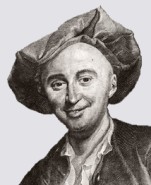|
|

|
|
Julien Offray
de La Mettrie
(1709-1751), a French physician and philosopher of materialism, is best known for his work L'Homme machine (Man a Machine). In it, the human body is explained as a piece of machinery. In the author’s own words: “A full detail is given of the several springs which move the human machine”. Because the book leaves no room for a separate, eternal soul, it was considered scandalous by the authorities and publicly burned. The author had to flee, but found asylum in Berlin at the court of the Prussian king Frederick the Great. Actually, de la Mettrie merely formulated a growing perception of his time and, in indirect ways, later greatly influenced the study of behavior.
|
|
|
There is no question that the gradual changes in the concept of “sex” also reflected changes in the image people had of themselves. After all, since the end of the Middle Ages the style of living in Europe had undergone a thorough and ever-accelerating transformation. The transition from a feudalistic to a capitalistic economy, the growth of trade, and the advance of technology gave rise to new attitudes, habits, and moral values. The emerging urban middle class or bourgeoisie trained itself for a greater degree of discipline, self-control, and self-denial than had ever been known before. Efficiency, punctuality, productivity, and profit were proclaimed as the new ideals. The human body came to be seen as a machine which had to perform in the most regular and rational manner possible. This machine was also expected to be practical and economical in its sexual functioning. Spontaneous physical responses and desires which interfered with the “proper” use of the sex organs were rigorously suppressed. At the same time, the growing suppression, subjugation, exploitation, and fear of the body also increasingly focused attention on its "sexual" qualities.
|
|
|
De La Mettrie’s controversial book.
Left: Title page in the original French (1748)
Right: The English translation (1750).
(About twenty years later, James Watt, with his improvement of the steam engine, started the “machine age”, i.e. the industrial revolution.)
|
|
|